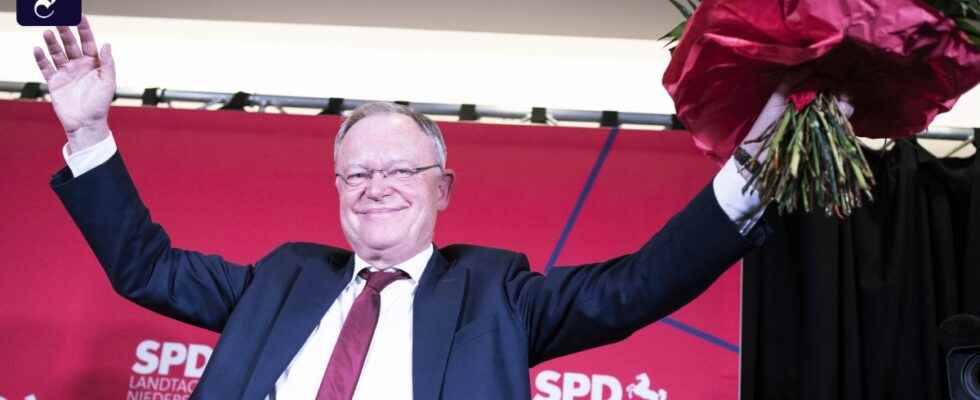DThe SPD clearly won the state elections in Lower Saxony on Sunday and will probably be able to govern together with the Greens. According to the provisional official final result, Prime Minister Stephan Weil managed to do significantly better with his party than the CDU under challenger Bernd Althusmann. Accordingly, the SPD came with slight losses compared to the election in 2017 to well over 30 percent of the votes.
The CDU, on the other hand, remained well below the 30 percent mark. Economics Minister Althusmann’s plan to replace the SPD at the head of the government in Hanover has thus failed. According to the provisional official final result, the SPD is 33.4 percent. The CDU reached 28.1 percent. CDU General Secretary Mario Czaja said: “It’s not a nice result for us.” The SPD had managed to completely decouple from the national trend, Czaja said on ZDF. Althusmann announced his resignation as CDU state chairman on Sunday evening.
Greens are increasing significantly
The Greens have made significant gains; According to the preliminary final result, they come to 14.5 percent. Before the election, Weil had made it clear that he wanted to lead a red-green government alliance if possible. The green top candidate Julia Willie Hamburg had not let herself be proclaimed as a candidate for the office of prime minister; she appeared in a dual leadership with the former Minister of Agriculture Christian Meyer. If the Greens in Lower Saxony were to enter a coalition, they would be in government in twelve of the 16 federal states.
The FDP, in the alliance of the coalition partners of the SPD and the Greens, missed the five percent hurdle. The Free Democrats come to 4.7 percent. FDP Vice Wolfgang Kubicki justified his party’s poor performance with the policy of the traffic light coalition and the role of the FDP in it. A significant proportion of FDP voters in Lower Saxony are still alien to the traffic lights in Berlin and the role of the FDP, said Kubicki on Sunday evening. You got off to a good start at the traffic lights, then Russia’s attack on Ukraine happened. He mentioned energy supplies, inflation and concerns about keeping the peace. “At any rate, there have been no reasonable answers to this so far. We’ll have to work on that or this traffic light will get into rough water.” Personnel issues didn’t play a role after this election, said Kubicki.
Slightly lower voter turnout
The AfD lands just behind the Greens and comes to 10.9 percent. The party with Stefan Marzischewski-Drewes was able to increase its share of the vote by 4.7 percentage points compared to the election five years ago. The party is thus stopping its downward trend of the past few months. For the first time since the elections to the Hamburg Parliament a good two and a half years ago, the AfD was able to win votes in a state election. Party leader Tino Chrupalla said on ZDF: “As the opposition, we didn’t just get protest votes, we showed a clear edge”.
Consequences: CDU state chief Althusmann resigns
:
Image: Reuters
The AfD is the only party that has named the causes of the dissatisfaction of the citizens. These are the energy crisis and the price increases that were caused by the “Habeck economic war” and the sanctions against Russia. “We have named the right topics.” The AfD had mainly occupied topics of the FDP and could use them for itself.
